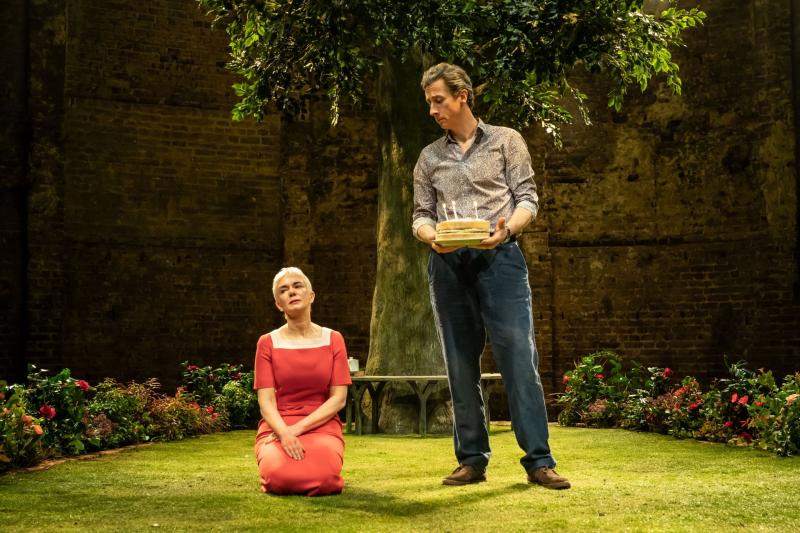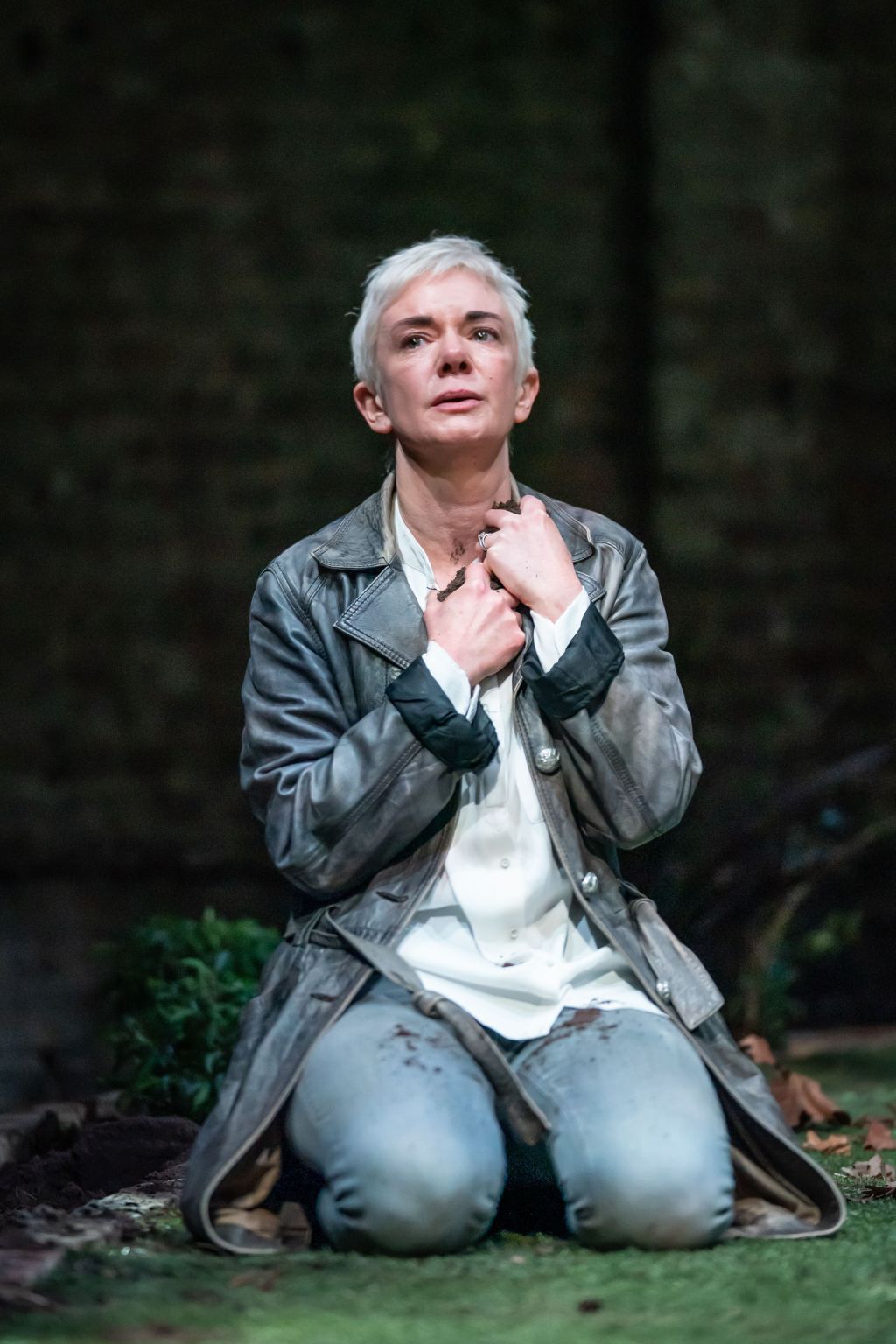Albion, Almeida Theatre review - more rewarding and resonant than ever | reviews, news & interviews
Albion, Almeida Theatre review - more rewarding and resonant than ever
Albion, Almeida Theatre review - more rewarding and resonant than ever
Mike Bartlett's play has deepened in accordance with our divisive times

It's not been three years since Albion premiered at the Almeida Theatre, since which time Brexit has happened and, not without coincidence, Mike Bartlett's time-specific play is beginning to look like one for the ages. Set amongst a community in physical and psychic limbo, Bartlett takes the pulse of a people, and a nation, at odds with themselves.
Spanning nine months and countless shifts in mood, the play begins, much as does The Cherry Orchard, with an Oxfordshire household aflutter with anticipation. A noted businesswoman called Audrey Walters (Victoria Hamilton, pictured below) has bought a house she used to visit she was young and has returned to in middle age for rural balm. Peppery to a fault largely to paper over abiding grief, Audrey is eager to up sticks from London and start afresh, not least in an attempt to salve the lasting wound left by the death several years before of her son James, a soldier who has left behind a grieving partner, Anna (Angel Coulby), who is herself nursing anguish of near-operatic proportions. (Her outpouring of emotion somewhat grandiloquently ends the first half.)
Bartlett, like the Russian master before him, knows how to assemble a motley crew and folds into the mix a neat amalgam of visitors and locals, English and foreign, that includes Audrey's long-ago chum Katherine (Helen Schlesinger), now a successful writer, and one of her acolytes. That last-named character is a local handiman called Gabriel, who nurses authorial ambitions of his own; the part allows Dónal Finn to mount a winning charm offensive much as Luke Thallon, since graduated to the now-previewing Leopoldstadt, did so memorably first time around. When he projects near the end a future most likely given over to serving coffee or, with luck, managing those who do, it's as if a fresh strand of disappointment has been located within a play alert to life's numerous defeats.
 Audrey's own family includes a proud layabout of a husband, a part winningly reprised by Nicholas Rowe, and a resentful Cambridge-educated daughter, Zara (Daisy Edgar-Jones), who drifts into the one relatonship in the play that stretches credibility, no matter how beautifully it is enacted by both participants. (Shame all that education didn't scrub out Zara's capacity for starting a sentence, "James and her".) Onlookers to the simmering cauldron of domestic angst include a husband-and-wife team of household retainers, each one battling a separate illness: the wife remains a gift of a part in the droll hands of Margot Leicester, who can bring down the house with the single word "hello". Lingering visibly as a domestic replacement where needed is a Polish cleaner (a no-nonsense Edyta Budnik) who clearly has doubts about the divided England she inhabits and is planning a life back home with her husband, but not before she makes plain a mind for business not that far removed from that of her employer - just with fewer zeroes to show (so far, anyway) for her ambition.
Audrey's own family includes a proud layabout of a husband, a part winningly reprised by Nicholas Rowe, and a resentful Cambridge-educated daughter, Zara (Daisy Edgar-Jones), who drifts into the one relatonship in the play that stretches credibility, no matter how beautifully it is enacted by both participants. (Shame all that education didn't scrub out Zara's capacity for starting a sentence, "James and her".) Onlookers to the simmering cauldron of domestic angst include a husband-and-wife team of household retainers, each one battling a separate illness: the wife remains a gift of a part in the droll hands of Margot Leicester, who can bring down the house with the single word "hello". Lingering visibly as a domestic replacement where needed is a Polish cleaner (a no-nonsense Edyta Budnik) who clearly has doubts about the divided England she inhabits and is planning a life back home with her husband, but not before she makes plain a mind for business not that far removed from that of her employer - just with fewer zeroes to show (so far, anyway) for her ambition.
Will Audrey find the peace she seeks in the tellingly named "Red Garden", a (metaphorically) blood-stained space thrillingly realised in a characteristically audacious Miriam Buether design that gets added to, and then depleted afresh, as events take their course? That question underpins proceedings that widen out in meaning and resonance as one reckoning or another is accomplished in the shadow of the capacious oak tree that the Almeida apparently has kept in storage from the first run.
It's not just because the director, Rupert Goold, has led Renée Zellweger to awards-season triumph of late in the film Judy that Hamilton's less generous-spirited Audrey nonetheless achieves a comparably mercurial grandeur that keeps you on side even when the character, Arkadina-style, lets rip with one blunt aspersion or another. All the while, this toned 50-something battle-ax (a birthday party proves a pivotal event) is seen to exalt the virtues of nostalgia even as she claims to want to battle ever onward, whatever that might mean. (We're never told how she voted in the Referendum, though one can guess.) The volte-face at the conclusion may seem to some like one reversal too many but more than resonates with the shifting eddies (only intensified since autumn, 2017) of a British realpolitik that has sprung one surprise over another and may continue to do so still. What price survival, you may well wonder? Bartlett's play tells of a specific Arcadia given over to decay and demolition, and as for the larger country that surrounds it, well, time will tell.
rating
Share this article
The future of Arts Journalism
You can stop theartsdesk.com closing!
We urgently need financing to survive. Our fundraising drive has thus far raised £49,000 but we need to reach £100,000 or we will be forced to close. Please contribute here: https://gofund.me/c3f6033d
And if you can forward this information to anyone who might assist, we’d be grateful.

Subscribe to theartsdesk.com
Thank you for continuing to read our work on theartsdesk.com. For unlimited access to every article in its entirety, including our archive of more than 15,000 pieces, we're asking for £5 per month or £40 per year. We feel it's a very good deal, and hope you do too.
To take a subscription now simply click here.
And if you're looking for that extra gift for a friend or family member, why not treat them to a theartsdesk.com gift subscription?
more Theatre
 The Maids, Donmar Warehouse review - vibrant cast lost in a spectacular-looking fever dream
Kip Williams revises Genet, with little gained in the update except eye-popping visuals
The Maids, Donmar Warehouse review - vibrant cast lost in a spectacular-looking fever dream
Kip Williams revises Genet, with little gained in the update except eye-popping visuals
 Ragdoll, Jermyn Street Theatre review - compelling and emotionally truthful
Katherine Moar returns with a Patty Hearst-inspired follow up to her debut hit 'Farm Hall'
Ragdoll, Jermyn Street Theatre review - compelling and emotionally truthful
Katherine Moar returns with a Patty Hearst-inspired follow up to her debut hit 'Farm Hall'
 Troilus and Cressida, Globe Theatre review - a 'problem play' with added problems
Raucous and carnivalesque, but also ugly and incomprehensible
Troilus and Cressida, Globe Theatre review - a 'problem play' with added problems
Raucous and carnivalesque, but also ugly and incomprehensible
 Clarkston, Trafalgar Theatre review - two lads on a road to nowhere
Netflix star, Joe Locke, is the selling point of a production that needs one
Clarkston, Trafalgar Theatre review - two lads on a road to nowhere
Netflix star, Joe Locke, is the selling point of a production that needs one
 Ghost Stories, Peacock Theatre review - spirited staging but short on scares
Impressive spectacle saves an ageing show in an unsuitable venue
Ghost Stories, Peacock Theatre review - spirited staging but short on scares
Impressive spectacle saves an ageing show in an unsuitable venue
 Hamlet, National Theatre review - turning tragedy to comedy is no joke
Hiran Abeyeskera’s childlike prince falls flat in a mixed production
Hamlet, National Theatre review - turning tragedy to comedy is no joke
Hiran Abeyeskera’s childlike prince falls flat in a mixed production
 Rohtko, Barbican review - postmodern meditation on fake and authentic art is less than the sum of its parts
Łukasz Twarkowski's production dazzles without illuminating
Rohtko, Barbican review - postmodern meditation on fake and authentic art is less than the sum of its parts
Łukasz Twarkowski's production dazzles without illuminating
 Lee, Park Theatre review - Lee Krasner looks back on her life as an artist
Informative and interesting, the play's format limits its potential
Lee, Park Theatre review - Lee Krasner looks back on her life as an artist
Informative and interesting, the play's format limits its potential
 Measure for Measure, RSC, Stratford review - 'problem play' has no problem with relevance
Shakespeare, in this adaptation, is at his most perceptive
Measure for Measure, RSC, Stratford review - 'problem play' has no problem with relevance
Shakespeare, in this adaptation, is at his most perceptive
 The Importance of Being Earnest, Noël Coward Theatre review - dazzling and delightful queer fest
West End transfer of National Theatre hit stars Stephen Fry and Olly Alexander
The Importance of Being Earnest, Noël Coward Theatre review - dazzling and delightful queer fest
West End transfer of National Theatre hit stars Stephen Fry and Olly Alexander
 Get Down Tonight, Charing Cross Theatre review - glitz and hits from the 70s
If you love the songs of KC and the Sunshine Band, Please Do Go!
Get Down Tonight, Charing Cross Theatre review - glitz and hits from the 70s
If you love the songs of KC and the Sunshine Band, Please Do Go!
 Punch, Apollo Theatre review - powerful play about the strength of redemption
James Graham's play transfixes the audience at every stage
Punch, Apollo Theatre review - powerful play about the strength of redemption
James Graham's play transfixes the audience at every stage

Add comment